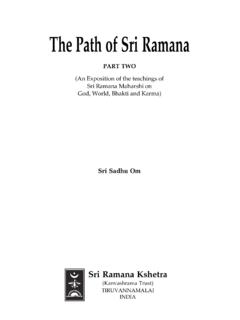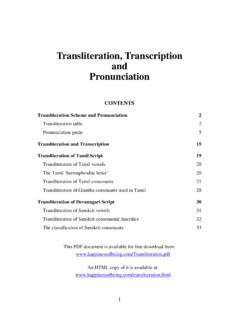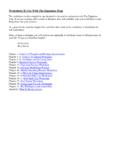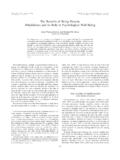Transcription of Happiness and The Art of Being
1 Happiness and The Art of Being An introduction to the philosophy and practice of the spiritual teachings of Bhagavan Sri Ramana (March 2012 Edition) Michael James Copyright 2006, 2007, 2012 Michael D A James All rights reserved. No part of this publication may be reproduced, except for brief and duly acknowledged quotations, or as expressly permitted by law, without the prior permission in writing of the author. First PDF edition: December 2006 Second PDF edition: March 2007 Third PDF edition: August 2007 First print edition (Canada): August 2007 First print edition (India): August 2007 Second print edition (US): March 2012 Second print edition (India): March 2012 Fourth PDF edition: March 2012 First Kindle edition: March 2012 This PDF copy of the March 2012 edition published by CreateSpace (ISBN 978-1475111576) is available for free download on the author s website at Other translations and writings on the teachings of Sri Ramana by Michael James are available on his website and blog.
2 For information about the author s books available on Amazon please visit DEDICATION To Bhagavan Sri Ramana, who taught me all that I know, and gave whatever inspiration created this book, and to his closest disciples, especially Sri Sivaprakasam Pillai, who first elicited and recorded his basic teachings, which he later formed into his precious treatise N Y r? (Who am I?), Sri Muruganar, who not only elicited his finest philosophical poems and verses, but also recorded his oral teachings most comprehensively, profoundly and poetically in Guru V caka K vai, and Sri Sadhu Om, who helped me to understand his teachings more clearly and deeply.
3 Contents Page Introduction 1 1 What is Happiness ? 49 2 Who am I? 73 3 The Nature of Our Mind 127 4 The Nature of Reality 181 5 What is True Knowledge? 221 6 True Knowledge and False Knowledge 273 7 The Illusion of Time and Space 299 8 The Science of Consciousness 317 9 Self-Investigation and Self-Surrender 331 10 The Practice of the Art of Being 373 Bibliography 465 Transliteration and Pronunciation 469 Glossary 473 1 Introduction Happiness lies deep within us, in the very core of our Being . Happiness does not exist in any external object, but only in us, who are the consciousness that experiences Happiness . Though we seem to derive Happiness from external objects or experiences, the Happiness that we thus enjoy in fact arises from within us.
4 Whatever turmoil our mind may be in, in the centre of our Being there always exists a state of perfect peace and joy, like the calm in the eye of a storm. Desire and fear agitate our mind, and obscure from its view the Happiness that always exists within it. When a desire is satisfied, or the cause of a fear is removed, the surface agitation of our mind subsides, and in that temporary calm our mind enjoys a taste of its own innate Happiness . Happiness is thus a state of Being a state in which our mind s habitual agitation is calmed. The activity of our mind disturbs it from its calm state of just Being , and causes it to lose sight of its own innermost Happiness .
5 To enjoy Happiness , therefore, all our mind need do is to cease all activity, returning calmly to its natural state of inactive Being , as it does daily in deep sleep. Therefore to master the art of Being happy, we must master the art and science of just Being . We must discover what the innermost core of our Being is, and we must learn to abide consciously and constantly in that state of pure Being , which underlies and supports (but nevertheless remains unaffected by) all the superficial activities of our mind: thinking, feeling and perceiving, remembering and forgetting, and so on. The art of just Being , remaining fully conscious but without any activity of the mind, is not only an art a practical skill that can be cultivated and applied to produce an experience of inexpressible beauty and joy but also a science an attempt to acquire true knowledge by keen observation and rigorous experiment.
6 And this art and science of Being is not only the art and science of Happiness , but also the art and science of consciousness, and the art and science of self-knowledge. The science of Being is incredibly simple and clear. To the human mind, however, it may appear to be complex and abstruse, not because it is in any way complex in itself, but because the mind which tries to comprehend it is such a complex bundle of thoughts and emotions desires, fears, anxieties, attachments, long-cherished beliefs and preconceived ideas that it tends to Happiness AND THE ART OF Being 2 cloud the pure simplicity and clarity of Being , making what is obvious appear to be obscure.
7 Like any other science, the science of Being begins with observation and analysis of something that we already know but do not fully understand, and proceeds by reasoning to formulate a plausible hypothesis that can explain what is observed, and then rigorously tests that hypothesis by precise and critical experiment. However, unlike all other sciences, this science does not study any object of knowledge, but instead studies the very power of knowing itself the power of consciousness that underlies the mind, the power by which all objects are known. Hence the truth discovered by means of this science is not something that can be demonstrated or proved objectively by one person to another.
8 It can, however, be directly experienced as a clear knowledge in the innermost core of each person who scrupulously pursues the necessary process of experiment till the true nature of Being which is the true nature of consciousness, and of Happiness is revealed in the full clarity of pure unadulterated self-consciousness. Just as the science of Being is fundamentally unlike all other sciences, so as an art it is fundamentally unlike all other arts, because it is not an art that involves doing anything. It is an art not of doing but of non-doing an art of just Being . The state of just Being is one in which our mind does not rise to do, think or know anything, yet it is a state of full consciousness consciousness not of anything else but only of Being .
9 The skill that is to be learnt in this art is not simply the skill to be because we always are and therefore require no special skill or effort to be , nor is it merely the skill to be without doing or thinking anything because we are able to be so each day in deep dreamless sleep. The skill to be cultivated is the skill to remain calmly and peacefully without doing or thinking anything, but nevertheless retaining a perfectly clear consciousness of Being that is, consciousness of our own Being or essential am -ness. Only in this pristine state of clear non-dual self-conscious Being , unclouded by the distracting agitation of thought and action, will the true nature of Being become perfectly clear, obvious, self-evident and free from even the least scope for doubt or confusion.
10 Our first and most direct experience of Being is that of our own Being or existence. First we know that we exist, and then only can we know of the existence of other things. But whereas our own existence is self-conscious, the existence of each other thing depends on us to be known. We know our own Being because we are consciousness. In other words, our Being is itself the consciousness that knows itself. It knows itself because it is essentially self-conscious. Thus it is reasonable to hypothesise that consciousness is the primal and essential form of Being . Without INTRODUCTION 3 consciousness, Being would be unknown, and without Being , consciousness would not exist.










